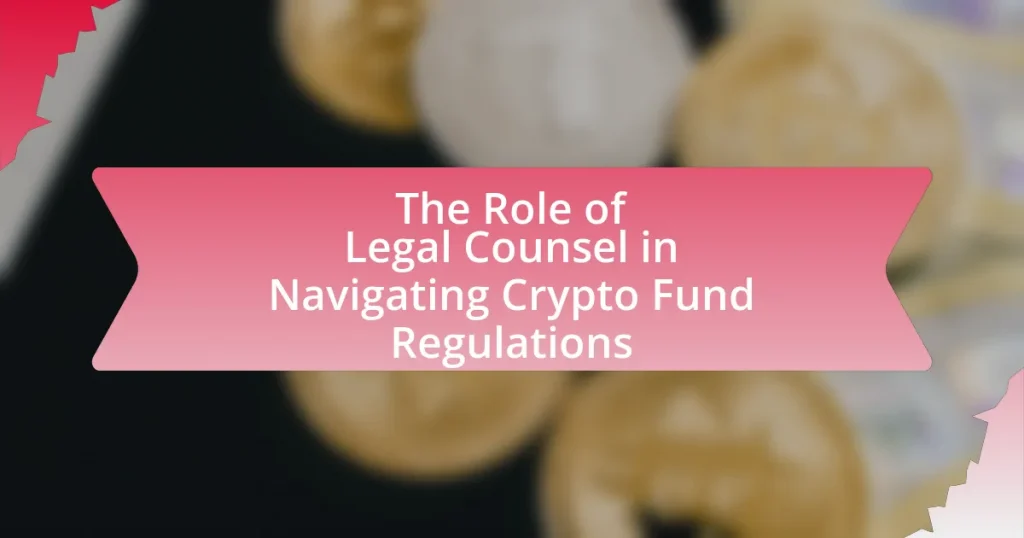Legal counsel plays a vital role in navigating the complex regulatory landscape surrounding crypto funds. They provide essential guidance on compliance with laws such as the Securities Act and the Investment Company Act, assist in drafting necessary documentation, and help identify and mitigate legal risks. The article outlines the specific regulations that crypto funds must adhere to, the contributions of legal counsel to compliance efforts, and the potential risks faced by fund managers without legal guidance. Additionally, it discusses best practices for legal counsels, future trends in regulatory frameworks, and the skills necessary for effective legal counsel in the evolving cryptocurrency sector.

What is the Role of Legal Counsel in Navigating Crypto Fund Regulations?
Legal counsel plays a critical role in navigating crypto fund regulations by providing expert guidance on compliance with complex legal frameworks. They analyze existing laws, such as the Securities Act and the Investment Company Act, to ensure that crypto funds operate within legal boundaries. Legal counsel also assists in drafting necessary documentation, such as offering memoranda and partnership agreements, which must adhere to regulatory standards. Furthermore, they help in identifying potential legal risks and developing strategies to mitigate them, ensuring that the fund’s operations align with both federal and state regulations. This expertise is essential, as the regulatory landscape for cryptocurrencies is rapidly evolving, requiring continuous monitoring and adaptation to new legal developments.
How do legal counsels contribute to compliance in crypto fund operations?
Legal counsels contribute to compliance in crypto fund operations by providing expert guidance on regulatory requirements and ensuring adherence to applicable laws. They analyze the evolving legal landscape surrounding cryptocurrencies, helping funds navigate complex regulations such as anti-money laundering (AML) and know your customer (KYC) laws. Legal counsels also draft and review contracts, ensuring that all operational agreements comply with legal standards. Their involvement mitigates risks associated with non-compliance, which can lead to significant financial penalties and reputational damage. For instance, in 2021, the Financial Action Task Force (FATF) issued guidelines that emphasized the importance of compliance in crypto operations, highlighting the critical role of legal expertise in aligning fund activities with these standards.
What specific regulations must crypto funds adhere to?
Crypto funds must adhere to regulations such as the Securities Act of 1933, the Investment Company Act of 1940, and the Anti-Money Laundering (AML) regulations enforced by the Financial Crimes Enforcement Network (FinCEN). These regulations require crypto funds to register as securities if they offer investment contracts, comply with disclosure requirements, and implement AML procedures to prevent illicit activities. For instance, the SEC has classified certain cryptocurrencies as securities, necessitating compliance with federal securities laws. Additionally, crypto funds must adhere to state regulations, which can vary significantly, further complicating compliance efforts.
How do legal counsels interpret these regulations for their clients?
Legal counsels interpret regulations for their clients by analyzing the specific legal language and context of the regulations to provide tailored advice. They assess how these regulations apply to their clients’ unique circumstances, ensuring compliance while also identifying potential risks and opportunities. For instance, legal counsels often reference the SEC’s guidelines on cryptocurrency investments to clarify compliance requirements for their clients, thereby enabling informed decision-making in the rapidly evolving crypto landscape.
Why is legal counsel essential for crypto fund managers?
Legal counsel is essential for crypto fund managers to ensure compliance with complex and evolving regulations. The cryptocurrency landscape is characterized by a lack of uniformity in legal frameworks across jurisdictions, which can expose fund managers to significant legal risks. For instance, the U.S. Securities and Exchange Commission (SEC) has implemented stringent regulations regarding securities offerings, and failure to comply can result in severe penalties. Legal counsel provides expertise in navigating these regulations, helping fund managers to structure their operations legally and mitigate risks associated with non-compliance. Furthermore, legal advisors can assist in drafting necessary documentation, such as investment agreements and disclosures, which are critical for maintaining transparency and protecting investor interests.
What risks do crypto fund managers face without legal guidance?
Crypto fund managers face significant risks without legal guidance, including regulatory non-compliance, financial penalties, and potential criminal liability. The rapidly evolving regulatory landscape for cryptocurrencies means that fund managers may inadvertently violate laws, such as securities regulations or anti-money laundering requirements, leading to fines or sanctions. For instance, in 2021, the U.S. Securities and Exchange Commission imposed over $1.5 billion in penalties on firms for non-compliance with securities laws related to crypto assets. Additionally, without legal counsel, fund managers may struggle to implement proper risk management strategies, exposing their funds to fraud or operational failures. This lack of legal oversight can also result in reputational damage, as investors may lose trust in a fund that faces legal challenges.
How can legal counsel mitigate these risks effectively?
Legal counsel can effectively mitigate risks in navigating crypto fund regulations by conducting thorough compliance assessments and implementing robust risk management strategies. By staying updated on evolving regulations, legal counsel can identify potential legal pitfalls and advise clients on best practices to ensure compliance. For instance, the Financial Action Task Force (FATF) guidelines emphasize the importance of anti-money laundering (AML) measures, which legal counsel can help integrate into fund operations. Additionally, legal counsel can draft clear contractual agreements that outline responsibilities and liabilities, thereby reducing the risk of disputes and regulatory penalties.
What are the key responsibilities of legal counsel in this context?
The key responsibilities of legal counsel in navigating crypto fund regulations include providing legal advice on compliance with applicable laws, drafting and reviewing contracts, and representing the fund in regulatory matters. Legal counsel ensures that the fund adheres to securities laws, anti-money laundering regulations, and tax obligations, which are critical in the highly regulated crypto environment. For instance, legal counsel must interpret the evolving regulatory landscape, such as the SEC’s guidelines on digital assets, to mitigate legal risks and ensure operational compliance.
How do legal counsels assist in drafting fund documentation?
Legal counsels assist in drafting fund documentation by ensuring compliance with applicable laws and regulations, which is critical for the legal validity of the fund. They analyze regulatory frameworks, such as the Investment Company Act and securities laws, to create documents that meet legal standards and protect the interests of both the fund and its investors. Additionally, legal counsels draft key documents like private placement memoranda, subscription agreements, and operating agreements, incorporating necessary disclosures and risk factors. Their expertise helps mitigate legal risks and enhances the fund’s credibility in the market.
What role do they play in investor relations and disclosures?
Legal counsel plays a critical role in investor relations and disclosures by ensuring compliance with regulatory requirements and facilitating transparent communication between the crypto fund and its investors. They help draft and review disclosure documents, such as prospectuses and annual reports, to ensure that all material information is accurately presented, thereby minimizing legal risks. Furthermore, legal counsel advises on the implications of regulatory changes, ensuring that the fund adheres to evolving laws, which is essential for maintaining investor trust and confidence. This role is substantiated by the necessity for funds to comply with regulations set forth by authorities like the SEC, which mandates clear and truthful disclosures to protect investors.
How do legal counsels stay updated on evolving regulations?
Legal counsels stay updated on evolving regulations by actively engaging in continuous education and monitoring industry developments. They subscribe to legal journals, attend seminars, and participate in webinars focused on regulatory changes, particularly in the cryptocurrency sector. Additionally, they often collaborate with professional networks and organizations that provide insights into legislative updates and best practices. For instance, the American Bar Association offers resources and updates that are crucial for legal professionals to remain informed about changes in laws affecting crypto funds.
What resources do legal counsels utilize for regulatory updates?
Legal counsels utilize a variety of resources for regulatory updates, including legal databases, government websites, industry publications, and professional networks. Legal databases such as Westlaw and LexisNexis provide comprehensive access to case law, statutes, and regulatory changes. Government websites, including those of the Securities and Exchange Commission and the Commodity Futures Trading Commission, offer official updates on regulations affecting crypto funds. Industry publications like CoinDesk and The Block deliver timely news and analysis on market trends and regulatory developments. Additionally, professional networks and associations, such as the American Bar Association, facilitate discussions and share insights among legal professionals regarding evolving regulations in the crypto space.
How do they adapt their strategies based on regulatory changes?
They adapt their strategies based on regulatory changes by conducting thorough assessments of new regulations and adjusting compliance frameworks accordingly. Legal counsel plays a critical role in this process by interpreting regulatory updates, advising on necessary operational changes, and ensuring that the crypto fund’s practices align with legal requirements. For instance, when the Financial Action Task Force (FATF) introduced guidelines on cryptocurrency transactions, many funds revised their anti-money laundering (AML) policies to comply with the new standards, demonstrating a proactive approach to regulatory adaptation.
What challenges do legal counsels face in the crypto fund landscape?
Legal counsels face significant challenges in the crypto fund landscape, primarily due to the rapidly evolving regulatory environment. The lack of clear and consistent regulations across jurisdictions complicates compliance efforts, as legal counsels must navigate varying laws that can change frequently. Additionally, the inherent complexity of blockchain technology and crypto assets requires legal professionals to possess specialized knowledge to effectively advise clients. Furthermore, the risk of regulatory scrutiny and potential legal liabilities increases as governments worldwide intensify their focus on anti-money laundering (AML) and know-your-customer (KYC) regulations. These factors collectively create a challenging landscape for legal counsels working with crypto funds.
How do they address the ambiguity in crypto regulations?
Legal counsel addresses the ambiguity in crypto regulations by providing guidance on compliance with existing laws and interpreting regulatory frameworks. They analyze the evolving legal landscape, including guidance from regulatory bodies like the SEC and CFTC, to help clients understand their obligations. For instance, legal experts often reference specific rulings and regulatory updates to clarify how laws apply to various crypto activities, ensuring that clients can navigate potential legal pitfalls effectively.
What strategies can they employ to overcome these challenges?
Legal counsel can employ several strategies to overcome challenges in navigating crypto fund regulations. First, they can conduct thorough research on the evolving regulatory landscape to ensure compliance with local and international laws. This includes staying updated on guidelines from regulatory bodies such as the SEC and CFTC, which have specific requirements for crypto funds. Second, legal counsel can establish strong relationships with regulators to facilitate open communication and gain insights into regulatory expectations. Third, they can implement robust compliance programs that include regular audits and training for fund managers to mitigate risks associated with non-compliance. These strategies are essential as they help legal counsel effectively guide crypto funds through complex regulatory environments, ensuring adherence to legal standards and minimizing potential penalties.
What best practices should legal counsels follow when advising crypto funds?
Legal counsels advising crypto funds should prioritize compliance with applicable regulations, ensuring that funds adhere to securities laws, anti-money laundering (AML) requirements, and tax obligations. This involves conducting thorough due diligence on the fund’s structure, investment strategies, and the jurisdictions in which they operate. Additionally, legal counsels should stay updated on evolving regulations and industry standards, as the crypto landscape is rapidly changing. Engaging with regulatory bodies and industry associations can provide valuable insights and foster relationships that may benefit the fund. Furthermore, implementing robust risk management practices and advising on the creation of clear internal policies can help mitigate legal risks.
How can legal counsels ensure thorough due diligence?
Legal counsels can ensure thorough due diligence by implementing a systematic approach that includes comprehensive research, risk assessment, and compliance verification. This involves reviewing all relevant legal documents, conducting background checks on involved parties, and analyzing regulatory requirements specific to the crypto fund industry. For instance, a study by the Financial Action Task Force (FATF) emphasizes the importance of understanding the legal landscape and potential risks associated with cryptocurrency transactions, which supports the necessity for detailed scrutiny in due diligence processes.
What communication strategies are effective in advising clients?
Effective communication strategies in advising clients include active listening, clear and concise messaging, and tailored communication styles. Active listening ensures that legal counsel fully understands client concerns and needs, which fosters trust and rapport. Clear and concise messaging helps clients grasp complex legal concepts, particularly in the intricate field of crypto fund regulations, where clarity is crucial for compliance. Tailoring communication styles to match the client’s preferences—whether formal or informal—enhances engagement and understanding. Research indicates that effective communication can significantly improve client satisfaction and outcomes, as evidenced by a study published in the Journal of Legal Studies, which found that clients who felt understood were more likely to follow legal advice.
What are the future trends for legal counsel in crypto fund regulations?
Future trends for legal counsel in crypto fund regulations include increased regulatory scrutiny, the development of comprehensive legal frameworks, and a focus on compliance and risk management. Regulatory bodies worldwide are enhancing their oversight of cryptocurrency activities, leading to a demand for legal experts who can navigate complex regulations. For instance, the Financial Action Task Force (FATF) has issued guidelines that require countries to implement stricter anti-money laundering measures for crypto transactions, which necessitates legal counsel to ensure compliance. Additionally, as jurisdictions establish clearer regulations, legal counsel will increasingly focus on advising clients on best practices for compliance and risk mitigation, reflecting the evolving landscape of crypto fund regulations.
How might regulatory frameworks evolve in the coming years?
Regulatory frameworks are likely to evolve towards increased transparency and stricter compliance requirements in the coming years. This evolution is driven by the growing need to address risks associated with cryptocurrencies, such as fraud and market manipulation, as evidenced by regulatory actions taken by authorities like the U.S. Securities and Exchange Commission, which has intensified scrutiny on crypto assets. Additionally, international cooperation among regulatory bodies is expected to strengthen, as seen in initiatives like the Financial Action Task Force’s guidelines, which aim to create a unified approach to cryptocurrency regulation globally. These developments indicate a trend towards more comprehensive and harmonized regulatory environments that legal counsel will need to navigate effectively.
What skills will be essential for legal counsels in this field?
Legal counsels in the field of crypto fund regulations must possess strong analytical skills, a deep understanding of financial regulations, and expertise in blockchain technology. Analytical skills enable legal counsels to interpret complex regulations and assess their implications for crypto funds. A thorough understanding of financial regulations, such as the Securities Act and Anti-Money Laundering laws, is crucial for ensuring compliance and advising clients effectively. Additionally, expertise in blockchain technology is essential for navigating the unique legal challenges posed by digital assets, as it allows legal counsels to provide informed guidance on issues like smart contracts and token offerings.
What practical tips can legal counsels implement to enhance their effectiveness?
Legal counsels can enhance their effectiveness by staying updated on regulatory changes and leveraging technology for compliance management. Regularly reviewing legal frameworks, such as the Financial Action Task Force guidelines, ensures that counsels are informed about the latest requirements in the crypto sector. Utilizing compliance software can streamline the monitoring of regulations, reducing the risk of non-compliance. Additionally, engaging in continuous professional development through workshops and seminars focused on crypto regulations can improve their expertise and adaptability in this rapidly evolving field.













